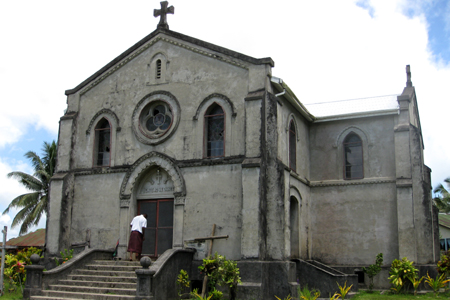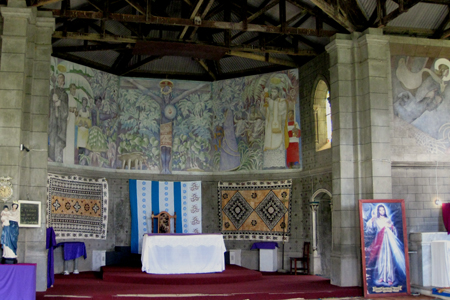| |
 |
 |
 |
| Comment on this report, or find other reports. |
 |
| Our Mystery Worshippers are volunteers who warm church pews for us around the world. If you'd like to become a Mystery Worshipper, start here. |
 |
| Find out how to reproduce this report in your church magazine or website. |
|
|
| 2348: St Francis
Xavier, Ra Province, Viti Levu, Fiji Islands |
 |
 |
 |
Mystery
Worshipper: AMB.
The church:
St Francis Xavier, Ra Province, Viti Levu, Fiji Islands.
Denomination:
Roman Catholic,
Archdiocese of Suva.
The building:
A very imposing mission church built by local people and French
missionaries, completed in 1917. The missionaries had settled
in the Ra Province in the late 1880s. The church has a Greek
cross plan with lancet and roundel windows in each facade. It
is constructed of locally quarried grey stone and sits atop
a hill with a commanding view to the north overlooking Bligh
Water. Rather haunting, one would imagine, on a dark day in
the rain. The church is known locally as the church of the Black
Christ due to the depiction of a Fijian-looking Christ figure
in the mural above the altar (see below). The motto of the church
incised above the principal entrance is Venite ad me omnes
(Come to me, all of you).
The church:
The church community is drawn from all over this part of Ra
Province. I was told that people come down from the hills above
the church to attend mass. There is a primary school and medical
clinic nearby and so one has a sense of a complete community.
Everyone was wearing Sunday best: the men in shirts, ties and
dark sulus, and the women in sulus and jumbas
(long skirts and tops) in vibrant floral patterns and colours.
The neighbourhood:
The drive up to the church from
the main road can at best be described as a goat track and is
impassable when wet. Fortunately, the rain had stopped earlier
in the morning. The northern coastal region of Viti Levu island
is very pretty, with steep hills running down to the water’s
edge and cane fields dotted all over the place.
The cast:
The Revd Petero Mataca (nephew of the current Archbishop of
Suva, the Most Revd Petero Mataca).
The date & time: Third
Sunday in Lent, 11 March 2012, 10.30am.
What was the name of the service?
Mass.
How full was the building?
Completely full.
Did anyone welcome you
personally?
Yes. When I parked the car near the church, a number of locals,
young and old, came up to me and welcomed me. They were very
friendly and asked me if I was attending the service and where
I lived.
Was your pew comfortable?
There is one pew in the church against the inner wall of the
south transept. There was a rather large nun stationed at one
end and she gestured to me to sit next to her. I did the local
thing and sat on the floor (covered in hand woven pandanus mats)
until my knees could take it no longer and I took up the nun's
offer of the pew.
How would you describe
the pre-service atmosphere?
There was a quite a bit of singing before the service commenced,
and then ten minutes before it started there was reverential
silence. Surprising really, given the number of children in
the church.
What were the exact opening
words of the service?
"In the name of the Father, and of the Son, and of the
Holy Spirit" (in Fijian).
What books did the congregation use during the
service?
There were no books used during the service. Everyone said the
mass responses and sang by heart.
What musical instruments
were played?
There were an electric keyboard and a guitar supporting the
singing – not that it needed supporting; it was beautiful
just by itself.
Did anything distract
you?
There were several distractions: the hideous chasuble Father
Petero was wearing – a sort of mean satin in purple (colour
of the season); the bad condition of the building (in much need
of refurbishment); and a young mother breastfeeding her baby
son in front of me on and off throughout the mass.

Was the worship stiff-upper-lip,
happy clappy, or what?
I would describe it as modern Catholic (i.e. Post Vatican II)
with a dash of Pacific inculturation. For example, at the end
of the offertory procession the bearers of the gifts sat down
in front of the priest and made a cobo (pronounced
thombo), a traditional "thank you" associated with
kava ceremonies.
Exactly how long was the
sermon?
9 minutes.
On a scale of 1-10, how good was the preacher?
8 – I gave the priest a score of 8 as he sounded quite convincing even though I couldn't understand a word.
In a nutshell, what was the sermon
about?
Unfortunately my Fijian is almost non existent and therefore I sat listening without following what was said. It was engaging all the same.
Which part of the service
was like being in heaven?
Looking at the murals on the north and south transept and around
the sanctuary. This is one of the most beautiful religious artworks
I have seen anywhere in the world. It was painted in 1961-63
by French artist Jean Charlot. Throughout the mural Charlot
used local plants, flowers and symbols. The Christ figure dressed
in a traditional masi cloth is dark-skinned, and making
homage to him are a Fijian male figure on one side and an Indian
woman on the other, representing the two cultures of Fiji. The
image of St Peter Chanel, a French missionary martyred in the
Pacific in the 19th century, reminds the worshippers of the
establishment of the Roman Catholic Church in the Pacific, while
the image of Archbishop Petero Mataca attended by a young Fijian
altar server symbolises the Church today – rooted in Fijian
custom and culture. I have seen this mural several times and
I still find something new each time I look at it. Remarkably,
given the climatic conditions, the mural is still in good condition.
And which part was like
being in... er... the other place?
The amount of bird poo sitting on the rafters was off-putting
and seemed a rather ominous threat hanging over my head. Mind
you, the roof structure is an impressive piece of timber architecture
in its own right – pity about the birds.
What happened when you
hung around after the service looking lost?
More locals came up and introduced
themselves with a handshake.
Everyone showed a rather endearing inquisitiveness.
How would you describe the after-service
coffee?
There was no after-service coffee, or kava for that matter.
How would you feel about
making this church your regular (where 10 = ecstatic, 0 = terminal)?
8 – It was an interesting mix of European ritual and indigenous
colour, sound and imagery.
Did the service make you
feel glad to be a Christian?
Yes indeed. The service, Lent notwithstanding, was joyous and
lively and was an example of the universality of the Catholic
faith.
What one thing will you remember about all this in seven days' time?
The image of the Hindu woman in the mural presenting the Christ figure with a garland. I hadn't noticed that in detail last time I looked at the mural. |
|
|
 |
 |
 |
| We rely on voluntary donations to stay online. If you're a regular visitor to Ship of Fools, please consider supporting us. |
 |
 |
 |
| The Mystery Pilgrim |
 |
| One of our most seasoned reporters makes the Camino pilgrimage to Santiago de Compostela in Spain. Read here. |
 |
 |
 |
| London churches |
 |
| Read reports from 70 London churches, visited by a small army of Mystery Worshippers on one single Sunday. Read here. |
| |
|
|
|
|


